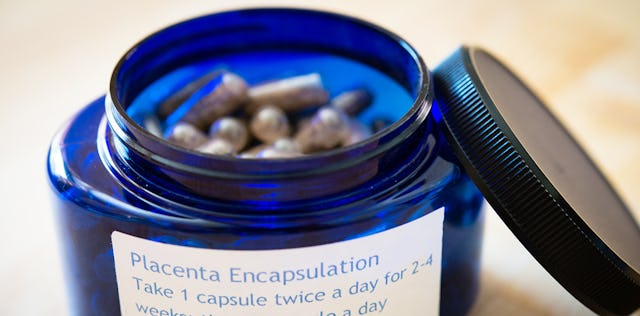PSA: Eating Your Placenta Isn’t Going To Prevent PPD

I’m definitely a “you do you and I’ll do me” kind of person when it comes to birthing, feeding, and child raising. I suppose I err on the “crunchy” side of things: I had my babies at home (with licensed midwives) and I breastfed them forever.
But in many ways I’m not what you’d call crunchy at all: our kids eat all manner of junk food (you know, along with the good stuff), we couldn’t pull off the whole cloth diapering thing – oh, and my kids probably spend way too much time on screens.
To me, it’s all about balance, doing the best you can, and making choices that suit your own sensibilities and needs. However, there is one arena where I can get a little judgy, and that is when people make choices with absolutely no regard to science. Case in point: the popular trend of consuming your placenta after birth.
BRENDAN SMIALOWSKI/Getty
Women gobbling up their placentas (usually in encapsulated pill form) has been all the rage for a few years now. It was always a thing amongst the crunchy crowd, but it became even more popularized thanks to celebrity endorsements from folks like Hilary Duff, Tamera Mowry, Mayim Bialik, and Alicia Silverstone.
Proponents of placenta eating say that it’s the best thing for giving you a boost postpartum. They say that’s placentas are chock full of vitamins like B12 and iron that can help you heal after birth – and perhaps most importantly, they say consuming your placenta can help balance your hormones and ward off the baby blues and even postpartum depression.
The thing is – besides the fact that I personally am totally grossed out about the idea of eating my own organs, no matter how “good for me” they are – there is really no evidence that consuming your placenta does any of those things.
Scientists have studied this a few times already. For example, a study published in Women and Birth from 2018 found that women who consumed placenta pills were no less likely to experience the baby blues or postpartum depression symptoms than women who took placebos.
Although the study was on the small side (27 women were observed), the study researchers concluded that, “No robust differences in postpartum maternal mood, bonding, or fatigue were detected between the placenta and placebo groups.”
“This finding may be especially important for women considering maternal placentophagy as a ‘natural’ (i.e., non-pharmacological) means of preventing or treating blues/depression,” they added.
However, a more robust study was recently published in Journal of Obstetrics and Gynaecology Canada that gives more credence to the idea that placenta consumption really isn’t going to do a damn thing when it comes to your postpartum experience and mood regulation.
This study researchers spent a decade looking at the postpartum experience of 138 women, all of whom had a history of mood disorders. They were looking to see if consuming placenta had a positive effect on depression, B12 levels, energy, or breastfeeding success.
The Washington Post/Getty
Their answer? A big, fat NOPE.
“When you ask women why they’re consuming their placenta, many will say that they think it will help improve their mood in the postpartum period,” lead researcher Jehannine Austin explained in a press release. “But there has been no research evidence showing that it really works, and our new study adds weight to this idea.”
What’s more, the researchers warn that there may be some dangers inherent in consuming placentas. You may recall a 2017 safety warning issued by the CDC after a baby contracted a bacterial infection from his mother who had consumed her placenta. Last year, Health Canada issued a similar safety warning, as reported by CBC News.
Think about it: there is no regulation out there for how placentas are prepped and handled before consumption, and no health agencies are regulating the folks who turn your placenta into pills. You really have no idea if you are going to be introducing a virus or bacteria into your body and passing this along to your baby.
Jehannine Austin and her research team concur. “Given the health risks associated with consuming your placenta, and the absence of detectable benefits, we strongly recommend women do not, and instead look to other mental wellness resources,” said Austin.
BINGO. Women should not be relying on placenta pills to cure PPD. There is no evidence that they work, and if women think they do, they may delay getting actual treatment for the disorder.
Look, I totally get why moms are looking for ways to feel more resilient after having a baby. And postpartum mood disorders should be taken with utmost seriousness. But looking for an easy fix like a placenta pill is not where it’s at (not to mention the potential dangers to yourself or your baby of consuming them).
What postpartum women need are caring, attentive, and accessible support systems in place so that they receive good nutrition, help with their babies, breastfeeding support, and mental health support. It’s awful that our country does not support postpartum moms adequately in those arenas. But that still doesn’t mean that we should turn to junk science to solve our problems.
If you are suffering from PPD, please don’t pop a placenta pill. Make an appointment with your doctor or a licensed therapist. Get evidenced-based treatment. Take meds if you need them. Your mental health is that important, and you deserve to feel strong and well.
This article was originally published on